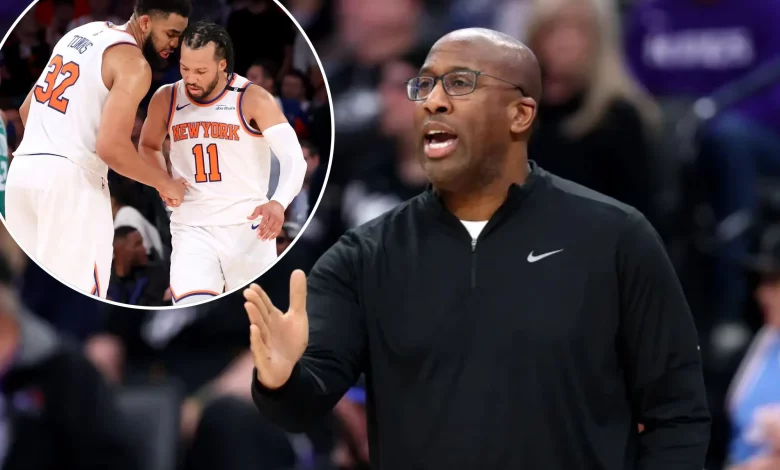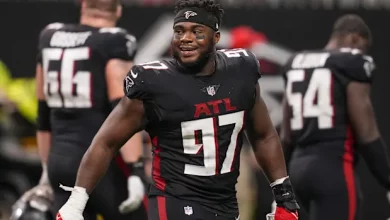Coach Mike Brown could enhance defense, implement a faster pace, diversify offensive sets, and develop young players, transforming the Knicks’ overall game strategy significantly.

The appointment of a new head coach often signifies a new chapter for an NBA franchise, and with Mike Brown taking the helm of the New York Knicks, the expectations are high. Known for his defensive expertise, basketball IQ, and ability to develop young talent, Brown’s coaching philosophy could bring a significant shift in the Knicks’ approach to both offense and defense. This analysis explores four primary ways Mike Brown could alter the Knicks’ game plan: enhancing defense, implementing a faster pace, diversifying offensive sets, and developing young players. Each of these areas has the potential to elevate the team’s competitiveness and consistency.
1. Enhancing Defensive Identity
The Foundation of Mike Brown’s Coaching Philosophy
Mike Brown’s reputation as a defensive-minded coach is well-established. During his tenure with the Cleveland Cavaliers and Golden State Warriors, Brown emphasized discipline, communication, and physicality on defense. His teams consistently ranked among the league’s best in defensive metrics, often frustrating opponents with strategic schemes and personnel deployment.
Current Knicks Defensive Profile
Historically, the Knicks have been known for their gritty, physical defense, especially under previous coaching regimes. However, inconsistencies, defensive lapses, and struggles against high-powered offenses have sometimes hampered their playoff aspirations. Improving defensive efficiency remains a priority for the franchise.
Potential Changes Under Mike Brown
- Discipline and Rotation Improvements: Brown’s emphasis on disciplined rotations and positional awareness could reduce defensive breakdowns. He is known for meticulous film study and pre-game preparation, which could help players anticipate and react better.
- Scheme Innovations: Brown might introduce more sophisticated defensive schemes, such as multiple switching defenses to contain versatile opponents, or employing trapping and double-team tactics to disrupt ball movement.
- Focus on Communication: Brown’s emphasis on communication could lead to more cohesive team defense, with players more alert and synchronized, reducing open shots and easy baskets for opponents.
- Player Development on Defense: Brown’s player development focus could help improve the defensive capabilities of key players like R.J. Barrett or Quentin Grimes, making the entire team more formidable.
Impact on the Knicks
Enhanced defense would likely lead to more wins, especially in playoff settings where defensive stops are crucial. A more disciplined and cohesive defense could also mask some offensive shortcomings, making the Knicks a more balanced and resilient team.
2. Implementing a Faster Pace
Transition to a More Up-Tempo Style
While Mike Brown’s teams are often lauded for their defensive schemes, he is also capable of integrating a faster-paced style when the personnel suits it. Transition offense can energize the team, create easier scoring opportunities, and capitalize on the athleticism of players like Jalen Brunson and RJ Barrett.
Current Pace of the Knicks
Traditionally, the Knicks play at a moderate pace, focusing on half-court execution and grinding out possessions. While this approach can be effective, it may limit opportunities against faster teams and reduce scoring potential.
Potential Changes Under Brown
- Emphasizing Transition Offense: Brown could encourage the team to push the ball in transition, especially after defensive stops or turnovers, to generate easy looks.
- Stamina and Conditioning: To sustain a faster pace, Brown would likely prioritize conditioning, ensuring players can maintain high energy levels throughout games.
- Spacing and Shooting: Faster pace often benefits teams with shooting threats, so Brown might emphasize spacing and quick decision-making to maximize scoring opportunities.
- Adjusting Playcalling: Incorporating quick hitters and fast-break options could diversify the Knicks’ offensive attack, making them less predictable and more dynamic.
Impact on the Knicks
A more uptempo style could lead to higher scoring games, increased fan engagement, and fatigue management for opponents. It could also make the team more versatile, able to adapt to different game situations and opponents.
3. Diversifying Offensive Sets
Moving Beyond Isolation and Pick-and-Roll
Historically, the Knicks have relied heavily on isolation plays and pick-and-rolls around Julius Randle and Jalen Brunson. While effective, over-reliance on these can become predictable and stagnate the offense.
Current Offensive Profile
The team’s offense often hinges on individual creation, which can lead to inconsistency if opposing defenses shut down primary options. Spreading the floor with diversified sets could open more driving lanes and create better shot opportunities.
Brown’s Offensive Philosophy
- Implementing Multiple Sets: Brown could introduce a variety of offensive schemes, such as motion offenses, ball screens, and off-ball cuts, to keep defenses guessing.
- Screen and Roll Variations: Incorporating dribble hand-offs, flare screens, and secondary actions can create mismatches and open looks.
- Involving Role Players: Giving more offensive responsibilities to secondary players like Obi Toppin or Quentin Grimes can diversify scoring options, making the offense less predictable.
- Player Movement and Spacing: Emphasizing continuous movement, screens, and spacing can create open shots and exploit defensive lapses.
Impact on the Knicks
A more diversified offense would lead to increased scoring efficiency, better shot selection, and the ability to adapt to different defensive schemes. It would also help in close games where predictable offensive patterns can be easily defended.
4. Developing Young Players
Building a Sustainable Future
One of Mike Brown’s strengths is his ability to develop young talent. For the Knicks, who possess promising prospects like Quentin Reddish, Jericho Sims, and the potential for internal growth from R.J. Barrett and others, this approach could be transformative.
Current Developmental State
While the Knicks have some young players with potential, inconsistent playing time and unclear roles have limited their growth. Brown’s reputation as a patient and strategic developer could accelerate their progress.
Potential Strategies
- Structured Playtime: Brown could implement a clear developmental plan, giving young players consistent minutes to build confidence and skills.
- Mentorship and Culture: Instilling a professional work ethic and basketball IQ can elevate young players’ performances and prepare them for playoff pressures.
- Tactical Growth: Focusing on teaching specific skills—such as shooting, ball-handling, or defensive positioning—can turn prospects into reliable rotation players.
- Leveraging Versatility: Brown’s flexible schemes can help young players find roles that maximize their strengths and hide weaknesses.
Impact on the Knicks
Developing internal talent ensures team sustainability and reduces reliance on external acquisitions. It also fosters a culture of growth, accountability, and long-term success.
The appointment of Mike Brown as the head coach of the New York Knicks holds the promise of a significant strategic overhaul. His defensive expertise could transform the team into one of the league’s toughest to score against, creating a formidable foundation for playoff success. Simultaneously, his flexibility and strategic acumen could facilitate a shift toward a faster-paced, more dynamic offense, diversifying their scoring options and making the team harder to defend.
Furthermore, Brown’s proven ability to develop young talent aligns with the Knicks’ aspirations for a sustainable, competitive future. By nurturing prospects and giving them meaningful roles, Brown could help establish a pipeline of reliable contributors.
In essence, Mike Brown’s influence could elevate the Knicks from a solid playoff team into a consistent contender by focusing on these four key areas. His strategic adjustments would not only improve the team’s immediate performance but also set the stage for long-term success rooted in disciplined defense, versatile offense, and player development.









